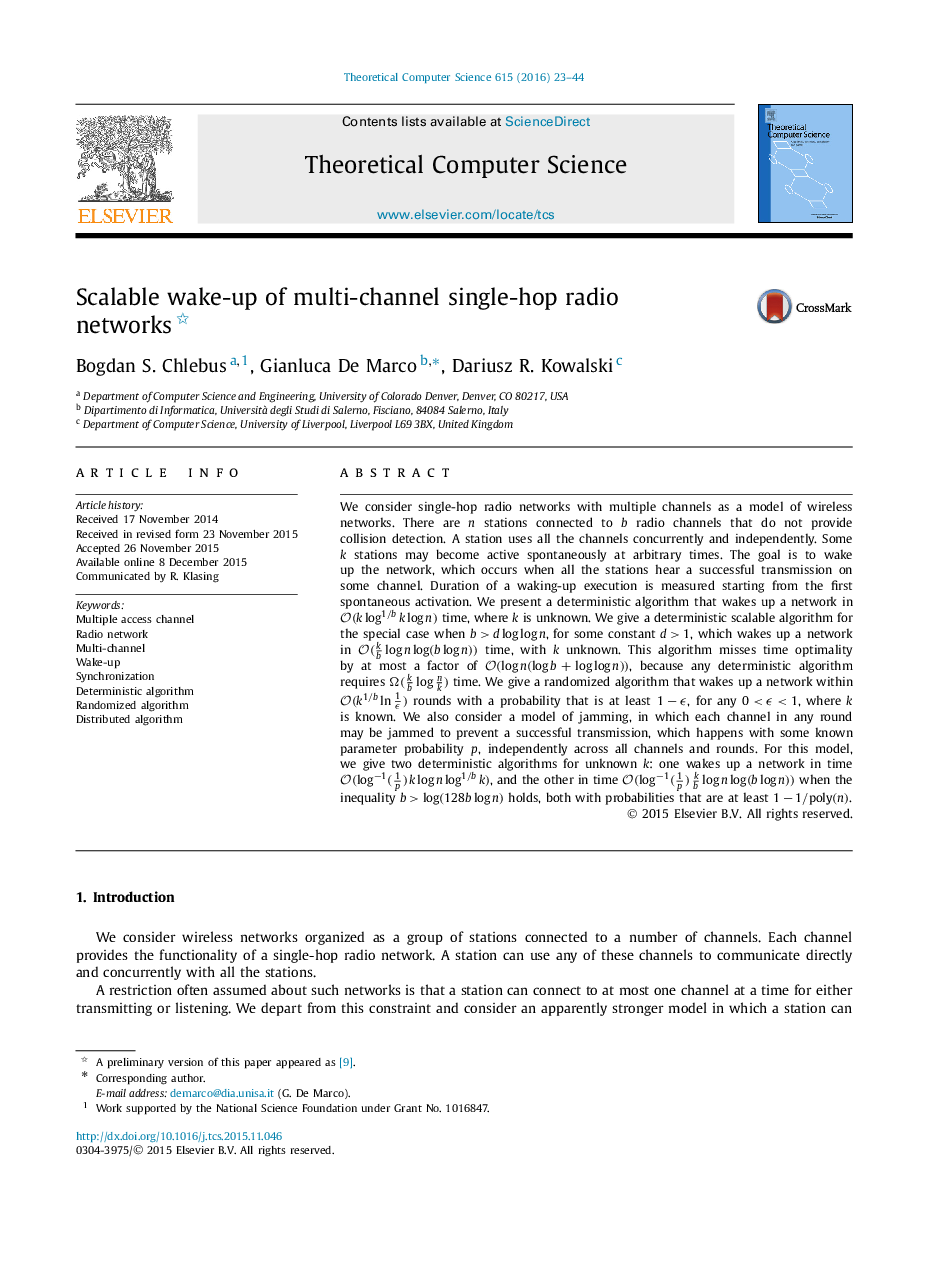| کد مقاله | کد نشریه | سال انتشار | مقاله انگلیسی | نسخه تمام متن |
|---|---|---|---|---|
| 6875980 | 690154 | 2016 | 22 صفحه PDF | دانلود رایگان |
عنوان انگلیسی مقاله ISI
Scalable wake-up of multi-channel single-hop radio networks
ترجمه فارسی عنوان
از شبکه های رادیویی تک کانون چند کاناله بیدار می شود
دانلود مقاله + سفارش ترجمه
دانلود مقاله ISI انگلیسی
رایگان برای ایرانیان
کلمات کلیدی
کانال دسترسی چندگانه، شبکه رادیویی، چند کاناله بیدار شدن هماهنگ سازی، الگوریتم تعیین کننده، الگوریتم تصادفی، الگوریتم توزیع،
موضوعات مرتبط
مهندسی و علوم پایه
مهندسی کامپیوتر
نظریه محاسباتی و ریاضیات
چکیده انگلیسی
We consider single-hop radio networks with multiple channels as a model of wireless networks. There are n stations connected to b radio channels that do not provide collision detection. A station uses all the channels concurrently and independently. Some k stations may become active spontaneously at arbitrary times. The goal is to wake up the network, which occurs when all the stations hear a successful transmission on some channel. Duration of a waking-up execution is measured starting from the first spontaneous activation. We present a deterministic algorithm that wakes up a network in O(klog1/bâ¡klogâ¡n) time, where k is unknown. We give a deterministic scalable algorithm for the special case when b>dlogâ¡logâ¡n, for some constant d>1, which wakes up a network in O(kblogâ¡nlogâ¡(blogâ¡n)) time, with k unknown. This algorithm misses time optimality by at most a factor of O(logâ¡n(logâ¡b+logâ¡logâ¡n)), because any deterministic algorithm requires Ω(kblogâ¡nk) time. We give a randomized algorithm that wakes up a network within O(k1/blnâ¡1ϵ) rounds with a probability that is at least 1âϵ, for any 0<ϵ<1, where k is known. We also consider a model of jamming, in which each channel in any round may be jammed to prevent a successful transmission, which happens with some known parameter probability p, independently across all channels and rounds. For this model, we give two deterministic algorithms for unknown k: one wakes up a network in time O(logâ1â¡(1p)klogâ¡nlog1/bâ¡k), and the other in time O(logâ1â¡(1p)kblogâ¡nlogâ¡(blogâ¡n)) when the inequality b>logâ¡(128blogâ¡n) holds, both with probabilities that are at least 1â1/poly(n).
ناشر
Database: Elsevier - ScienceDirect (ساینس دایرکت)
Journal: Theoretical Computer Science - Volume 615, 15 February 2016, Pages 23-44
Journal: Theoretical Computer Science - Volume 615, 15 February 2016, Pages 23-44
نویسندگان
Bogdan S. Chlebus, Gianluca De Marco, Dariusz R. Kowalski,
